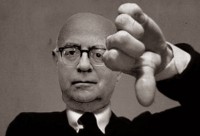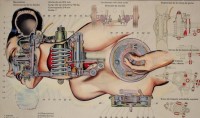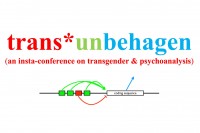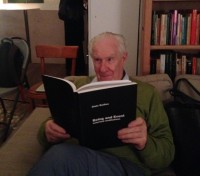ECHO: A seminar with Vanessa Place and Jamieson Webster, in conversation with Jack Halberstam, Evan Malater, Sam McKinniss, and Naomi Toth
What is Echo after? This event was the sixth in the series “In Authenticity,” hosted by Vanessa Place and Jamieson Webster. PARTICIPANTS: Jack Halberstam is Visiting Professor of Gender Studies and English at Columbia University. Halberstam is the author of five books including: Skin Shows: Gothic Horror and the Technology of Monsters (Duke UP, 1995), Female Masculinity (Duke UP, 1998), In A Queer Time and Place (NYU Press, 2005), The Queer Art of Failure (Duke UP, 2011) and Gaga Feminism: Sex, Gender, and the End of Normal (Beacon Press, 2012) and has written articles that have appeared in numerous journals, magazines and collections. Jack is a popular speaker and gives lectures around the country and internationally every year. Halberstam is currently working on several proje...Read More
Book Launch: “Lacan on Laughter—The new LOL” with Simon Critchley, Patricia Gherovici, Dany Nobus, Manya Steinkoler, and Jamieson Webster
How to fight a situation that seems farcical? When reality reaches absurdity, the subversive power of laughter steps in. Laughter is never innocent, it happens to us, at times inappropriately and inauspiciously. Psychoanalysis is well known for having shed some light on the perennial mysteries of what we do not control – dreams, parapraxes, symptoms, and sexual problems. While the Freudian slip and the bungled act have become part of Western culture’s lingua franca, it is less commonly known that psychoanalysis provides revelatory insights about the mechanisms of jokes, comedy, humor and their effects. Many people today would happily admit to their Oedipus Complex, but few would feel comfortable reflecting on why they laugh at the humiliation of their co-worker, titter at an ethnic or sexi...Read More
David Bell: New Barbarisms
All cultures develop their own modes of self-explanation, but such explanations, somewhat like symptoms, inevitably conceal as much as they reveal. In this sense psychoanalysis may be well placed to enter into a critical relation with the forms of consciousness that characterize our age. At the current conjuncture we are witnessing an escalating descent into a kind of institutionalized barbarism which unleashes forms of group behavior which require a social and psychological understanding. The time seems right to return to the classic texts that ache to address these matters- Freud’s ‘Group Psychology and the Analysis of the Ego’, ‘Civilization and its Discontents’, and Theodor Adorno’s ‘Freudian theory and the Pattern of Fascist Propaganda’. We will engage in a close reading of these text...Read More
Laurence Rickels: All You Vampires
The title “All You Vampires” summarizes the drift of the presentation by tampering with the title of Robert Heinlein’s time-travel story “All You Zombies” and placing the vampire in the seat of sole survivor (and mourner). To this end I attend to the origin story of the living dead, Richard Matheson’s “I Am Legend.” The contest that reopened at the start of the new millennium between identification with the undead and thrill-a-kill consumerism of the living dead also rereleased but did not contain the prospect of psychopathic violence, of the psycho as our near-miss double at close quarters, which slasher and splatter movies carried out unto therapeutic termination by the 1990s, but which at the time of vampirism’s return to a culture industry monopolized by zombieism found a n...Read More
Marcus Coelen: Schreber – Text and Transference
Schreber does not stop triggering transference. The Memoirs of My Nervous Illness, published in 1903, drew Jung to draw Freud’s attention to it, leading the latter to write his “Remarks on an Autobiographically Described Case of Paranoia” (1911)—and since then an ever growing textual network of writing, speaking, and gesticulating, is thinking psychosis and practicing its language with Schreber and schreberisms in mind. This seminar will be devoted to reading selectively the Memoirs themselves, Freud’s “Remarks” and Lacan’s “On a Question Preliminary to Any Possible Treatment of Psychosis.” Approaching such a voluminous and demanding corpus in a condensed manner might allow us to perceive more clearly how, in each of these instances, the effort is made to respond to madness with both form ...Read More
Das Unbehagen in conversation with Paul Verhaeghe
Summary by Evan Malater Verhaeghe at this point in his career seems interested in accessible models that can be shared beyond the enclaves that speak Lacanian. He gave us a rendition of ideas in his last book, What About Me (Identity is the title in the original, his publisher thought that this hokey title was better for America). Part One recapitulates the major theme of Civilization and its Discontents, the conflict between desire, drives and the needs of civilization. This is further broken down into three eras of civilization: 1) the age of the right orgasm or Victorian times. 2) the age of compulsory free love (post May 1968) and 3) the Age of Enjoyment by installment or the Enron society, which is how he describes the present. Stripped of the Lacanian mouldings, Verhaeghe offers some...Read More
Trans*Unbehagen: What is Trans*Psychoanalysis
Introduction by Evan Malater This event was born from the ashes of a listserv thread that has reached 100 posts and shows no signs of dying. So to start, a passage from a post by Cecilia Wu: “ If it is our goal as a progressive society to maximize the range of gender expression, why bother with the being of gender? Isn’t being notorious for anchoring potential to rosetta stones of yore? Doesn’t being lend itself to the inhospitable crust of identity? Wouldn’t a trans ethic prefer to unyoke itself from the foolishness of imaginary tags, preferring to freewheel? Well, not quite. Trans is not a pure potentiality, just as god is not a free standing authority. There is no connectivity without tethering. God can’t do anything without a body, a body can’t do anything...Read More
Psychoanalysis and the Occult
Psychoanalysis and the Occult (Case Material on Psychic Reality) April 9 2016 – NPAP Sponsored by Analytica.org and Unbehagen.org Created by Scott Von and David Schweichler Click here for link to audio Thee Psychoanalysis and the Occult symposium took place last week on April 9 2016. It was a unique event in content and form. This topic and its controversies were at the origin of psychoanalysis in the lineage form Mesmer to Charcot to Freud, the censoring of Freud’s research on telepathy from the Traumdeutung, and his early split with his “greatest student” Carl Jung. Jung and Reich both wrote their last books on “UFO”s in the 50s and in the same decade Georges Devereux published a rare book on “Psychoanalysis and the Occult” exposing much material of psychoanalyst’...Read More
Freud as a Thinker of the Political Body: Fear and Distress as Political Affects – Vladimir Safatle in Conversation with Marcus Coelen
“For Freud distress is a prerequisite for social emancipation, not an experience of resignation or vulnerability, a demand for care by proto-parental figures, or a continued political experience of exploitation of fear. What we have in Freud the affirmation of distress as an ontological insecurity with the political function of reducing demand for an authority based on the phantasmagoric constitution of sovereign power. All political action is initially the action of a landslide and only distressed people are able to act politically. Freud shows us how a truly emancipatory politics is based on the affective circulation of experiences of distress, not on building fantasies to defend ourselves against it. In this sense, politics can be thought as a practice that allows distress to appe...Read More
Institute No Institute
Becoming a psychoanalyst is founded upon a subjective transformation that occurs in a personal analysis. It cannot be measured or predicted, yet it is the necessary factor that allows one to conduct analytic treatment. Neither the analyst alone nor a group of independent observers can determine its occurrence, but somehow together they may. That something so difficult to determine lies at the heart of professional transmission has troubled the field of psychoanalysis from its inception. Institutes, schools, and broader communities of psychoanalysts have struggled to harness this transformation to formal models of training. They have invariably encountered obstacles in the structures of authority and the exercise of power. While training outside institutions is not explicitly subject to the...Read More
A Panel for the Launch of George Makari’s “Soul Machine: The Invention of the Modern Mind”
“Imagine a time in the future when your mind might travel. Perhaps it would enter a different torso or a foreign face. Would you still possess the same self, the same being? Our minds, most of us would agree, define us; they carry our personhood, and where they go, we go too. In Western culture, much depends upon this belief; it underpins a great deal of our literature, art, politics, and jurisprudence. It is the foundation of the commonsense psychology so crucial to social life. The concept of the mind is everywhere, and yet at the same time, it is strangely nowhere. The most powerful arbiter of truth in contemporary life, natural science, refuses to ratify this belief. While our own psyches seem abundantly clear to us, attempts to objectively establish their existence have been mir...Read More
Double Entendre: Katy Bohinc, Rachael Wilson & Jamieson Webster respond to Alain Badiou
Wendy’s Subway presented performances and discussion of Bohinc’s “psycho-sexual thriller” Dear Alain, Webster’s The Life and Death of Psychoanalysis (Karnac Books, 2011), which addresses Badiou’s theory of love and asks how it may be conceived from the psychoanalyst’s discourse; and Wilson’s “Fifteen Theses,” on her artist’s book created from Badiou’s Being and Event to investigate the rhythms of reading, pleasure in distraction, and the book as a “cover.” Badiou attended performatively, as an audience member. Click here to listen to Jamieson Webster at Wendy’s Subway Click here to listen to Rachel Wilson and Katy Bohinc at Wendy’s Subway Post-show discussion: Cecilia Wu responds to Jamieson Webster’s “Alain Badiou is Not a Walk in the Park”: Jami...Read More























